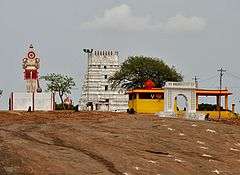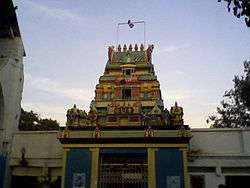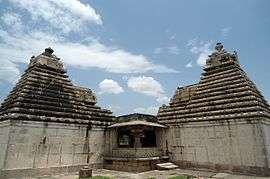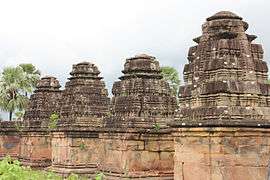Keesaragutta Temple
| Keesaragutta | |
|---|---|
 | |
| Name | |
| Proper name | Keesaragutta |
| Geography | |
| Country | India |
| State | Telangana |
| Location | Keesara, Medchal District |
| Culture | |
| Primary deity | Lord Shiva |
| Architecture | |
| Architectural styles | [India. |
| History and governance | |
| Website | www.keesaraguttatemple.com, www.keesara.com |
Keesaragutta Temple is a Hindu temple dedicated to Lord Siva and his consorts Bhavani and Sivadurga at Keesaragutta in Medchal-Malkajgiri District. It is about 40 km from Hyderabad and 10 km from ECIL. It is located on a small hillock. The temple draws thousands of devotees on Shivaratri.[1]
Legend
Legend has it that Sri Rama installed the Siva lingam here to atone for the sin of killing Ravana, a Brahman. He selected this beautiful valley surrounded by hills and verdant greenery for the purpose and ordered Hanuman to bring a Sivlingam from Varanasi. Hanuman was late in arriving with the Siva lingam and as the auspicious hour was nearing, Lord Siva himself appeared before Sri Rama and presented a Sivilingam for installation. Hence the lingam in the temple is called Swayambhu Linga. It is also called Ramalingeswara as lord Sri Rama had installed the lingam.
Hanuman returned with 101 lingams for selection from Varanasi and felt aggrieved at not having his lingam installed. Hence he threw them all over the area. Even to this day several lingams are found scattered all over the place outside the temple.
To mollify Hanuman, Sri Rama ordained that precedence would be given to him for worship at the temple. He also said that the hillock where the lingam was installed would bear his name kesarigiri i.e., Hanuman, the son of Kesari. Over a period of time, it has colloquially transformed and is now known as Keesara and the hill as Keesaragutta. Ever since, the rituals follow the command of Sri Rama.
Archaeological Excavations
Exploration and Excavations were conducted by the archaeological department in the surroundings of Keesaragutta[2] Temple. Many Remnants of Brick structures and Shiva Lingas were found on the Hill north of the temple and a hillock near the water resource. The remnants belonged to Chalukyan Empire reign. Fortification walls, Yaga shala and Prayer hall's were excavated here. Some Vestige remnants and rock cut cisterns were found on the hills as an indication of Jainism and Buddhism Flourished contemporarily. On October 18, 2014, twelve idols of Jain Tirthankara dating back to the 4th-5th century were found near the temple steps at a depth of one foot which proves that Jainism co-existed along with Hinduism at Keesaragutta during the time of Vishnukundins in 4-5th century.[3][4]
References
| Wikimedia Commons has media related to Keesaragutta Temple. |
- ↑ http://articles.timesofindia.indiatimes.com/2003-03-02/hyderabad/27267754_1_devotees-special-prayers-temple
- ↑ http://asi.nic.in/nmma_reviews/Indian%20Archaeology%201975-76%20A%20Review.pdf
- ↑ "Idols of Jain Tirthankaras belonging to 4th century unearthed - Times of India".
- ↑ http://www.sakshipost.com/index.php/news/state/47446-was-keesargutta-a-jain-temple.html?psource=Feature


